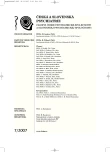-
Medical journals
- Career
Atypical Antipsychotics and Prolongation of QTc Interval
Authors: V. Pálenský; R. Přikryl; A. Floriánová 1; M. Weislamplová 1; T. Kašpárek; O. Synek; E. Češková; J. Špinar 1
Authors‘ workplace: Psychiatrická klinika LF MU a FN Brno přednostka prof. MUDr. E. Češková, CSc. Interní kardiologická klinika LF MU a FN Brno ; přednosta prof. MUDr. J. Špinar, CSc. 1
Published in: Čes. a slov. Psychiat., 103, 2007, No. 7, pp. 325-328.
Category: Original Article
Overview
The aim of our study
was to monitor the occurrence of QT interval prolongation in a non selected population of psychiatric patients treated with atypical antipsychotics in monotherapy and combined therapy. In consecutive patients hospitalized at psychotic wards at the Department of Psychiatry, Faculty of Medicine Masaryk University and Faculty Hospital Brno treated with these drugs a 12-lead ECG was recorded (50 mm/s, 20 mm/mV), QT intervals were measured manually, corrected according to Bazett. QTc intervals of 470 ms (females) and 450 ms (males) were considered borderline, longer QTc intervals were considered pathologic. ECGs were recorded in 351 patients, 180 males, 171 females. These were hospitalised with thediagnosis of schizophrenia (61.5%), bipolar disorder (21.5%) and other (17%). Abnormal QTc values were observed in 7 patients, 6 females and 1 male, 4 were borderline and 3 pathologic. Females were treated by monotherapy, males by combined therapy. Values associated with high risk of arrhythmias (over 500 ms) were not observed. This might be related to the general trend to use lower doses and increasing awareness about the drug-induced long QT syndrome.Key words:
schizophrenia, atypical antipsychotics, side effects, QTc, ECG.
Labels
Addictology Paediatric psychiatry Psychiatry
Article was published inCzech and Slovak Psychiatry

2007 Issue 7-
All articles in this issue
- Atypical Antipsychotics and Prolongation of QTc Interval
- Retention in Substitution Programm by Buprenorphine
- Lack of Insight, Non-compliance and Their Mutual Relations in Schizophrenic Disorder
- Psychotherapy of Depression – the Approach of Gestalt Therapy
- Sexual Revictimization
- Atypical Ending of Posttraumatic Stress Disorder
- Czech and Slovak Psychiatry
- Journal archive
- Current issue
- Online only
- About the journal
Most read in this issue- Atypical Antipsychotics and Prolongation of QTc Interval
- Psychotherapy of Depression – the Approach of Gestalt Therapy
- Lack of Insight, Non-compliance and Their Mutual Relations in Schizophrenic Disorder
- Atypical Ending of Posttraumatic Stress Disorder
Login#ADS_BOTTOM_SCRIPTS#Forgotten passwordEnter the email address that you registered with. We will send you instructions on how to set a new password.
- Career

